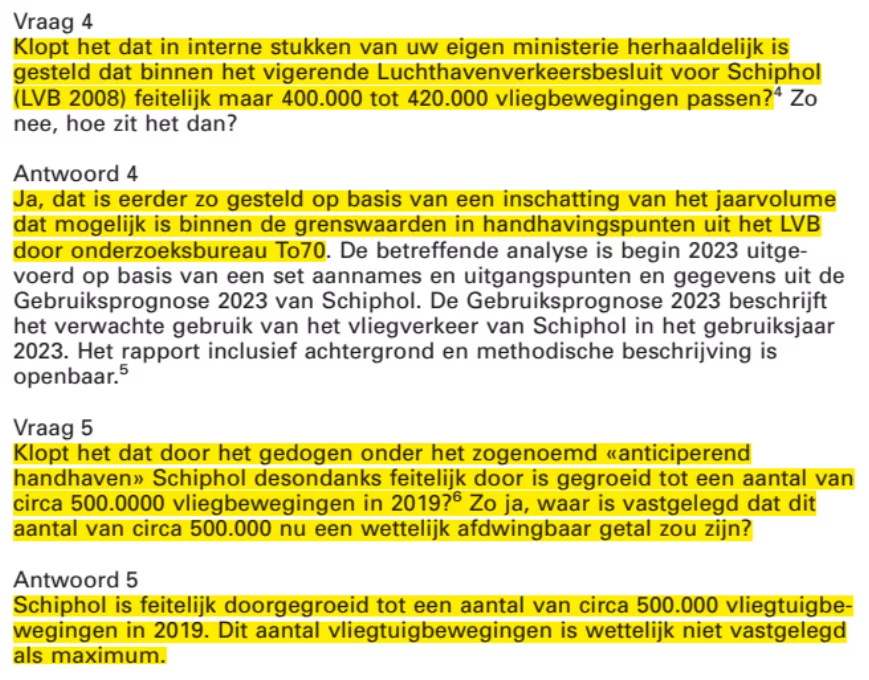This is a machine translation from Dutch.
Today the judge in The Hague served a historic verdict. The government has squandered the interests of local residents of Schiphol for decades and must now comply with the law. That means an end to anticipatory That means an end to anticipatory maintenance and up to 400,000 flights.
It is over with anticipatory maintenance. The judge was crystal clear about this: this form of tolerance has no legal basis and is therefore unlawful. The government must immediately stop and enforce on the legislation in force, as laid down in the Airport Traffic Decree of 2008 (LVB2008).
The noise limits included in that decision do not allow Schiphol to operate more than 400,000 to 420,000 flights per year. This is evident from calculations made by the Ministry of Infrastructure by Bureau To70. Earlier, the ministry started from more flight space, but that turned out to be wish calculations.

No “balanced approach”
For that contraction, the ministry does not have to wait for the ‘balanced approach’ that the European Union demands. The reason for this is that this method has only been prescribed since 2016, while the applicable legislation dates from 2008, well in order to comply with the obligation.

The judge blames the State for having been keeping local residents on a leash since the introduction of the LVB2008. For example, new residents in the region are excluded from the calculations and the enforcement points do not give a complete picture of the spread and severity of the noise.
Moreover, it is not only the people who live within the noise contours of Schiphol who have to deal with severe nuisance and sleep disruption, but also many people outside. Nor are they included in the ministry’s figures.
No leg to stand on
The court points out that people with nuisance and sleep disturbance have nowhere to go with their complaints. Legally they have no leg to stand on and that is not in line with human rights.
“The government has always looked at the importance of the aviation industry and only in the last analysis at the interests of local residents. As a result, there is too little left for local residents,” the judge said.
Listen to the judge’s verdict yourself
“This way of weighing interests does not meet the requirements of the Convention for the Protection of Human Rights and Fundamental Freedoms (ECHR) in matters such as that weighing up.”
Minister at work
Outgoing Minister Mark Harbers is put to work. He must come up with legislation within a year that does meet the preconditions of the ECHR and where the citizen receives practical and effective legal protection. He must also make a new – and now correct – weighing up for interests.
Harbers must also update the LVB2008 and include the new residents who are located in the region after 2005. Until now, the ministry worked in the calculations with a highly outdated housing stock that gives a much too tight picture of the current number of local residents and therefore not of the actual nuisance and sleep disturbance.
The judge did not want to impose the standards of the World Health Organization on the State because those guidelines are not binding.
Appeal not delaying in the upper occupation
The verdict is “executable to stock” and therefore goes directly into it. An expected appeal by the case – if only to delay reintroduction of enforcement – therefore has no suspensive effect.
The verdict is the result of years of hard work by a team of volunteers of the Foundation Right to Aircraft Protection (RBV). They were excited about the verdict. “We should not have hoped for more,” says chairman Jan Boomhouwer.
With the verdict in hand, it is a breeze for the people in the region to submit a claim to the State individually or as a group, a lawyer reports to us. After all, the government has acted unlawfully for these people for a decade and a half. This has caused damage, including the health, real estate value and labour productivity.
– Interesting news? Please consider a donation through iDeal.